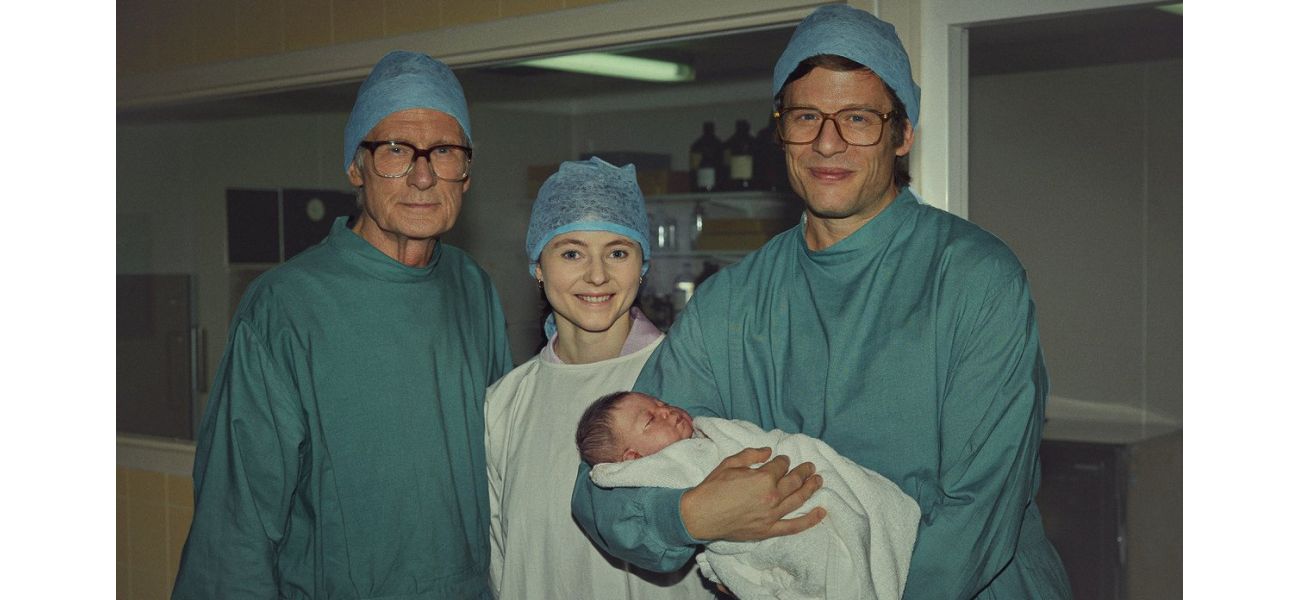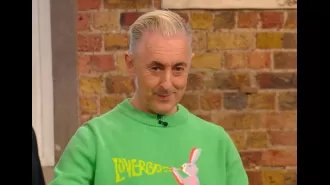James Norton realizes the true impact of IVF after uncovering a startling reality.
"Netflix's latest drama unveils the 'amazing' narrative of IVF."
November 19th 2024.

As we eagerly anticipate the next chapter, we can't help but reflect on the previous page of history. It was on July 25, 1978, that Louise Joy Brown made her grand entrance as the first test-tube baby. But what many don't know is the decade-long struggle that led to this miraculous moment. Thankfully, we can now uncover the untold story.
In an interview with Metro, actor James Norton candidly admits, "I had embarrassingly limited knowledge about the topic." As the premiere of Netflix's new historic drama Joy approaches, he reflects on how he, like many of us in our mid to late 30s, only had a surface-level understanding of in vitro fertilization (IVF). "I knew some beautiful children who were a product of this amazing science, but I took it for granted," he confesses. However, diving into the origins of IVF through this film was a "lovely journey" for Norton.
As the lead stars of Joy, Norton and his co-stars were not well-versed in IVF before taking on their roles. A quick Google search of "who invented IVF?" reveals two names, Dr. Patrick Steptoe and scientist Robert "Bob" Edwards. However, this answer fails to recognize the vital contributions of nurse and embryologist Jean Purdy, who was only recognized by the Royal Society of Biology in 2015. It was Jean who provided the missing piece that made IVF possible and also gave a much-needed voice to this incredible part of British history.
Filmmaker Ben Taylor shares, "It's an incredible story that has never been told on the big screen." It wasn't until screenwriting couple Jack Thorne and Rachel Mason decided to tell it through the perspective of Jean Purdy, who has been "marginalized and erased from history," that the project truly came to life. Sex Education director Rachel Mason explains, "It opened up the only way to tell the story. A lot of people had tried before, but no one could crack it." Telling the story through Jean's eyes added a crucial female perspective and took the focus away from the scientific aspect of IVF.
What makes Jean's character stand out on screen is the emotional conflict between her family and community and her unwavering commitment to changing the lives of women, no matter the cost. This tension creates powerful scenes of anguish and redemption. "It's admirable how much she sacrificed for this work," says co-star Thomasin McKenzie. "She sacrificed her relationships and community, all for the greater good of helping people like herself who couldn't have children."
The film also sparked meaningful conversations for the New Zealand actor in her own life. "It opened up discussions about the right to choose whether or not to have children, without judgment," she shares. "It empowered me to have a better understanding of my own anatomy." One scene, in particular, where Jean receives the news that she can't have children, stayed with Thomasin long after filming ended. "It highlighted the pressure that women carry all their lives to fulfill societal expectations," she reflects.
As the industry shifts towards more complex and nuanced female characters, Thomasin acknowledges her luck in playing such roles. "Not all, but a fair share of the scripts I've read have had complex and nuanced female characters," she notes. "But there have also been some where I thought, 'okay, there's not much going on there,' which is disappointing." The fact that Joy is directed and written by a team of parents who have gone through IVF themselves adds a personal connection and depth to the project. "It's something that dominates your life, and I'll be eternally grateful for it," shares director Ben Taylor, who has two sons through IVF. "When I read this script, I knew I had to be a part of it."
In the year 1978, a significant event took place that would change the world forever. Louise Joy Brown became the first ever test-tube baby, marking a momentous achievement in history. However, not many people are aware of the struggles and challenges that had to be overcome to make this miracle a reality. That is, until now.
James Norton, the renowned actor known for his role in "Happy Valley", admits that he had very little knowledge about the topic until the premiere of the new Netflix drama "Joy". This drama tells the story of three British pioneers who revolutionized the lives of millions of families worldwide with the invention of in vitro fertilization (IVF). Like many others in their late thirties, James had only encountered couples going through the IVF process and had a limited understanding of the science behind it. However, learning about the origin of IVF was a "lovely journey" for him.
If one were to google "who invented IVF?", two names would appear in bold at the top of the search box - Dr. Patrick Steptoe and scientist Robert "Bob" Edwards. However, this seemingly straightforward answer fails to acknowledge the crucial contributions of nurse and embryologist Jean Purdy, who was finally recognized by the Royal Society of Biology in 2015. It was Jean who provided the missing piece of the puzzle that made IVF possible and also brought to light the incredible history of IVF in Britain.
Filmmaker Ben Taylor expresses his surprise at the fact that such a significant event in British history had not been portrayed on the big screen before. It was only when screenwriting couple Jack Thorne and Rachel Mason decided to tell the story through the perspective of Jean Purdy, who had been marginalized and erased from history, that the project finally came to fruition. The director of "Sex Education", who was at the helm of this project, believes that Jean's perspective was crucial in telling the story and taking it away from just being about "test tubes".
What makes Jean's character stand out on screen is the emotional conflict between her family and community and her unwavering commitment to changing the lives of women, regardless of the cost. This creates a rich tension that is reflected in the powerful and heartwarming scenes in the movie. Thomasin McKenzie, who plays Jean in the film, admires how much Jean sacrificed for her work, even at the cost of her relationships and community. The film also sparked conversations for the young actress about the right to choose and feeling empowered in one's decisions.
One particular scene, where Jean is told by Patrick that she is unable to have children, stayed with Thomasin long after the cameras stopped rolling. The pressure that women carry all their lives to fulfill societal expectations is something that struck a chord with the actress. She feels fortunate to have played complex and nuanced roles in her career, which was not always the case for female characters in cinema.
For Ben, Jack, and Rachel, the film was more than just a project; it was deeply personal. All three of them have their own IVF babies and understand the struggles and emotions that come with it. Ben, in particular, considers himself lucky to have two lovely boys through IVF and is eternally grateful for the experience. When he came across the script for "Joy", he knew he had to be a part of it.
In an interview with Metro, actor James Norton candidly admits, "I had embarrassingly limited knowledge about the topic." As the premiere of Netflix's new historic drama Joy approaches, he reflects on how he, like many of us in our mid to late 30s, only had a surface-level understanding of in vitro fertilization (IVF). "I knew some beautiful children who were a product of this amazing science, but I took it for granted," he confesses. However, diving into the origins of IVF through this film was a "lovely journey" for Norton.
As the lead stars of Joy, Norton and his co-stars were not well-versed in IVF before taking on their roles. A quick Google search of "who invented IVF?" reveals two names, Dr. Patrick Steptoe and scientist Robert "Bob" Edwards. However, this answer fails to recognize the vital contributions of nurse and embryologist Jean Purdy, who was only recognized by the Royal Society of Biology in 2015. It was Jean who provided the missing piece that made IVF possible and also gave a much-needed voice to this incredible part of British history.
Filmmaker Ben Taylor shares, "It's an incredible story that has never been told on the big screen." It wasn't until screenwriting couple Jack Thorne and Rachel Mason decided to tell it through the perspective of Jean Purdy, who has been "marginalized and erased from history," that the project truly came to life. Sex Education director Rachel Mason explains, "It opened up the only way to tell the story. A lot of people had tried before, but no one could crack it." Telling the story through Jean's eyes added a crucial female perspective and took the focus away from the scientific aspect of IVF.
What makes Jean's character stand out on screen is the emotional conflict between her family and community and her unwavering commitment to changing the lives of women, no matter the cost. This tension creates powerful scenes of anguish and redemption. "It's admirable how much she sacrificed for this work," says co-star Thomasin McKenzie. "She sacrificed her relationships and community, all for the greater good of helping people like herself who couldn't have children."
The film also sparked meaningful conversations for the New Zealand actor in her own life. "It opened up discussions about the right to choose whether or not to have children, without judgment," she shares. "It empowered me to have a better understanding of my own anatomy." One scene, in particular, where Jean receives the news that she can't have children, stayed with Thomasin long after filming ended. "It highlighted the pressure that women carry all their lives to fulfill societal expectations," she reflects.
As the industry shifts towards more complex and nuanced female characters, Thomasin acknowledges her luck in playing such roles. "Not all, but a fair share of the scripts I've read have had complex and nuanced female characters," she notes. "But there have also been some where I thought, 'okay, there's not much going on there,' which is disappointing." The fact that Joy is directed and written by a team of parents who have gone through IVF themselves adds a personal connection and depth to the project. "It's something that dominates your life, and I'll be eternally grateful for it," shares director Ben Taylor, who has two sons through IVF. "When I read this script, I knew I had to be a part of it."
In the year 1978, a significant event took place that would change the world forever. Louise Joy Brown became the first ever test-tube baby, marking a momentous achievement in history. However, not many people are aware of the struggles and challenges that had to be overcome to make this miracle a reality. That is, until now.
James Norton, the renowned actor known for his role in "Happy Valley", admits that he had very little knowledge about the topic until the premiere of the new Netflix drama "Joy". This drama tells the story of three British pioneers who revolutionized the lives of millions of families worldwide with the invention of in vitro fertilization (IVF). Like many others in their late thirties, James had only encountered couples going through the IVF process and had a limited understanding of the science behind it. However, learning about the origin of IVF was a "lovely journey" for him.
If one were to google "who invented IVF?", two names would appear in bold at the top of the search box - Dr. Patrick Steptoe and scientist Robert "Bob" Edwards. However, this seemingly straightforward answer fails to acknowledge the crucial contributions of nurse and embryologist Jean Purdy, who was finally recognized by the Royal Society of Biology in 2015. It was Jean who provided the missing piece of the puzzle that made IVF possible and also brought to light the incredible history of IVF in Britain.
Filmmaker Ben Taylor expresses his surprise at the fact that such a significant event in British history had not been portrayed on the big screen before. It was only when screenwriting couple Jack Thorne and Rachel Mason decided to tell the story through the perspective of Jean Purdy, who had been marginalized and erased from history, that the project finally came to fruition. The director of "Sex Education", who was at the helm of this project, believes that Jean's perspective was crucial in telling the story and taking it away from just being about "test tubes".
What makes Jean's character stand out on screen is the emotional conflict between her family and community and her unwavering commitment to changing the lives of women, regardless of the cost. This creates a rich tension that is reflected in the powerful and heartwarming scenes in the movie. Thomasin McKenzie, who plays Jean in the film, admires how much Jean sacrificed for her work, even at the cost of her relationships and community. The film also sparked conversations for the young actress about the right to choose and feeling empowered in one's decisions.
One particular scene, where Jean is told by Patrick that she is unable to have children, stayed with Thomasin long after the cameras stopped rolling. The pressure that women carry all their lives to fulfill societal expectations is something that struck a chord with the actress. She feels fortunate to have played complex and nuanced roles in her career, which was not always the case for female characters in cinema.
For Ben, Jack, and Rachel, the film was more than just a project; it was deeply personal. All three of them have their own IVF babies and understand the struggles and emotions that come with it. Ben, in particular, considers himself lucky to have two lovely boys through IVF and is eternally grateful for the experience. When he came across the script for "Joy", he knew he had to be a part of it.
[This article has been trending online recently and has been generated with AI. Your feed is customized.]
[Generative AI is experimental.]
0
0
Submit Comment





